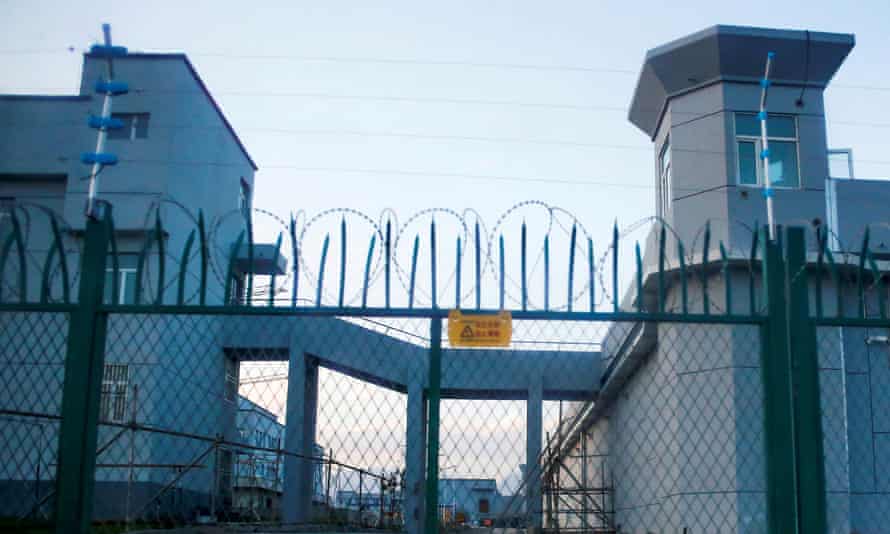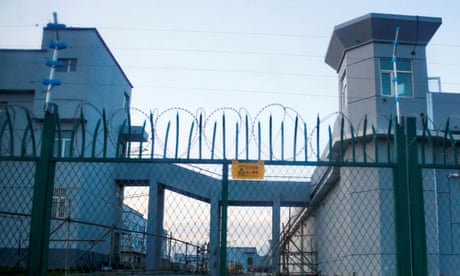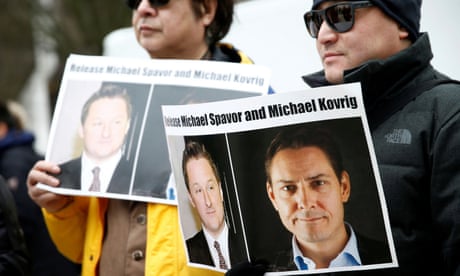Trudeau plays to the media hoping to regain high ground in light of up coming election: Residential Schools/Uighurs
Trudeau calls for probe into China’s mistreatment of Uyghurs as Beijing attacks Canada’s record on reconciliation
China issues furious response after Canada condemns human rights record
Canada leads more than 40 countries in voicing concern over Xinjiang, Hong Kong and Tibet, sparking clash at UN

Canada has led more than 40 countries in expressing serious concerns over Beijing’s repressive actions in Xinjiang, Hong Kong and Tibet, prompting a furious response from Beijing over Canada’s colonial history.
The exchange at the UN human rights council on Tuesday marks the latest downturn in relations between Canada and China, which have deteriorated steadily as the two countries clash over human rights, trade and allegations of “hostage diplomacy”.
Canada urged China to allow “immediate, meaningful and unfettered access” so independent observers can visit its western Xinjiang region, where UN experts say nearly a million Uyghurs and other Turkic Muslims have been detained in camps.
“We are gravely concerned about the human rights situation in the Xinjiang Uyghur Autonomous Region,” Canada’s ambassador Leslie Norton said Tuesday. The joint statement – backed by Australia, Britain, France, Germany, Italy, Japan, Spain and the US – cited reports of torture or cruel, inhumane and degrading treatment or punishment, forced sterilization, sexual and gender-based violence, and forced separation of children from their parents.
China pre-empted the statement by attacking Canada’s colonial past – a move that reflected growing frustration over scrutiny of its Xinjiang policies, and its increasingly tense relationship with Canada.
Citing the recent discovery of what are believed to be the unmarked graves of 215 children at the site of a former residential school, Jiang Duan, a senior official at China’s mission to the UN in Geneva, called for a “thorough and impartial investigation” into Canada’s historical treatment of Indigenous peoples and compensation for victims.
Jiang’s statement was read out on behalf of Russia, Belarus, Iran, North Korea, Syria and Venezuela, all of which have been accused of wide-ranging human rights abuses.
“Historically, Canada robbed the Indigenous people of their land, killed them, and eradicated their culture,” the statement said.
Justin Trudeau said that Canada continued to have a deeply fractured relationship with Indigenous peoples – but he argued that Canada had taken steps to acknowledge past injustices.
“In Canada, we had a Truth and Reconciliation Commission. Where is China’s Truth and Reconciliation Commission?” said Trudeau. “Where is [China’s] truth?”
The commission concluded in 2015 that Canada had pursued a police of “cultural genocide” towards Indigenous people and recommended a string of actions to repair the damage. Seven years later, a majority of the commission’s 94 “calls to action” have gone unanswered.
In recent months, western countries have become increasingly bold in their criticism of China’s treatment of the Uyghur Muslim minority in the Xinjiang region. China denies mistreating the Uyghurs, saying the government is simply running vocational training centres aimed at countering extremism.
In February, Canadian parliament passed a motion declaring that China’s abuse of Muslim minorities constituted genocide. The British, Dutch and Lithuanian parliaments have all passed similar motions, and two successive American presidents have called the Chinese action a genocide.
“China is not recognizing there is even a problem. That is a pretty fundamental difference,” said Trudeau. “Where is the openness that Canada has always shown and the responsibility that Canada has taken for the terrible mistakes of the past … many of which continue into the present?”
Relations between China and Canada have remained tense for more than two years since the arrest on a US warrant of Huawei’s Meng Wanzhou in December 2018. Within days, two Canadian citizens – Michael Kovrig and Michael Spavor – were detained in China. In March, the men were subjected to secret court trials after more than two years in jail. Canada has described the men’s detention as “hostage diplomacy”.
China’s attacks on Canada’s colonial legacy mirror a similar strategy against the United States earlier this year, after calls for boycotts of Xinjiang cotton put China on the defensive amid accusations of forced labour.
Using historical photos of cotton fields in the American south, the foreign ministry spokesperson Hua Chunying told reporters in January that the United States had a far worse human rights record.
“Here is a picture of black slaves being forced to work in cotton fields in the US,” said Hua. “Here is another picture of cotton fields in China’s Xinjiang where more than 70% of the cotton is picked with machines. There is never ‘forced labor’ in picking cotton in Xinjiang.”
Stephanie Carvin, a professor of international affairs at Carleton University in Ottawa, said the Chinese response followed a tried and tested formula.
“This ‘what-about-ism’ is an authoritarian reflex,” she said. “And it’s not new. Canada faced criticism over its treatment over Indigenous people from the Soviet Union during the cold war. But it’s also important to recognize it for what it is- a strategy to deflect from meaningful criticism, which, in this case, is the treatment of Uyghurs in Xinjiang.”
‘Where is their truth?’ Justin Trudeau fires back at China after it calls to investigate Canada
Canada leads international coalition calling on China to allow investigators free access to Xinjiang
Separate alliance of 60 elected officials from 18 countries calls for probe into 'indications of genocide'
Canada is leading an international effort at the United Nations to demand that China allow "meaningful and unfettered access" to investigate "credible reports" of widespread human rights violations against China's Muslim minority in Xinjiang province, CBC News has learned.
An international alliance that is expected to include more than 20 countries — including Canada's G7 partners and Sweden, Switzerland, the Netherlands, Australia and New Zealand — will make its demand in a joint statement it's expected to deliver to the United Nations Human Rights Council's headquarters in Geneva, Switzerland on Monday.
"We are gravely concerned about the human rights situation in the Xinjiang Uyghur Autonomous Region," says a draft of the joint statement seen by CBC News and addressed to UN High Commissioner for Human Rights Michelle Bachelet.
"We urge China to allow immediate, meaningful and unfettered access to Xinjiang for independent observers, including the High Commissioner," reads the statement, which also calls for the end of "the arbitrary detention of Uyghurs and members of other Muslim minorities."
The statement also expresses concerns about the "deterioration of fundamental freedoms" in Hong Kong and Tibet and calls on China to "abide by their human rights obligations."
The international effort comes as 60 parliamentarians from 18 countries in the Inter-Parliamentary Alliance on China, including Canada, plan to issue a separate public letter asking the UN Human Rights Council to set up an independent commission of inquiry to investigate what it calls crimes against humanity and indications of genocide in Xinjiang province.
These diplomatic moves follow years of reports from media, academic and UN experts that have accused China of imprisoning more than a million Muslim-minority Uyghurs in concentration and "deradicalization" camps, targeting them for forced labour, sexual violence, population control methods and sweeping surveillance.
The Chinese government has denied the claims of human rights abuses.
China pushes back
In February, the Chinese government lashed out at Canada after the House of Commons voted to declare that China is committing genocide against Uyghurs and other Turkic Muslims in Xinjiang.
"Facts have proven that there's no genocide in Xinjiang. This is the lie of the century made up by extremely anti-China forces," said Wang Wenbin, a spokesperson for China's foreign ministry, according to a translation of his remarks provided by the foreign ministry.
The Commons motion said that China's persecution of these groups amounts to genocide, according to the definition set out in the 1948 UN Genocide Convention, and called on the federal government to formally adopt that position.
A substantial majority of MPs — including most Liberals who participated — voted in favour of the non-binding motion, which was proposed by the Conservative Party.
Prime Minister Justin Trudeau and all but one member of his cabinet were absent for the vote. Foreign Affairs Minister Marc Garneau was present but said he was abstaining from the vote "on behalf of the Government of Canada."
A draft of the joint statement to be delivered to the council in Geneva expresses grave concerns about what is going on in Xinjiang.
'Torture ... cruel, inhuman and degrading treatment'
"Credible reports indicate that over a million people have been arbitrarily detained in Xinjiang and that there is widespread surveillance disproportionately targeting Uyghurs and other minorities and restrictions on fundamental freedoms and Uyghur culture," the draft joint statement says.
"There are also reports of torture or cruel, inhuman and degrading treatment or punishment, forced sterilization, sexual and gender-based violence, and forced separation of children from their parents by authorities."
The joint statement also expresses concerns about allegations of "forced labour" and the "collective repression of religious and ethnic minorities" by the Chinese regime.
Aware of the coming joint statement, China issued a preemptive rebuke to the countries behind it, accusing them of habitually using "human rights issues as tools to practice blatant political manipulation."
"Some individual countries like the U.S., Canada and the U.K. have been seeking to attack and smear China under the guise of human rights, making and spreading disinformation, and abusing the platform of the UN Human Rights Council," Chinese foreign ministry spokesperson Zhao Lijian told reporters in a briefing.
Zhao went on to say pressure tactics like the joint statement only obstruct international dialogue and cooperation on human rights. He also accused the countries behind the joint statement of ignoring human rights abuses in their own countries.
"They have human rights issues like racism, gun violence, forced labour, child labour, and the list goes on and on," Zhao said, citing the death of George Floyd in police custody in the U.S. and reports on the discovery of "the remains of Indigenous children found in residential schools in Canada."
The public letter on behalf of elected officials from 18 countries in the Inter-Parliamentary Alliance on China separately alleges that China is "committing crimes against humanity" in Xinjiang, with "credible sources finding indications of genocide."
The parliamentarians also accuse the council of "failing to end impunity for perpetrators of abuse."
"At least one million people are held in arbitrary detention, with inmates exposed to sexual abuse, torture and political indoctrination," the letter says.
"Since 2015, birth rates of minority groups have declined dramatically in the wake of forced sterilizations, forced abortions and draconian birth control policies against minority groups."
The coalition of international parliamentarians is asking the council to establish an independent commission of inquiry to investigate allegations of human rights abuses, identify the alleged perpetrators, make recommendations to end those abuses and report back regularly to the UN on progress.
China did not commit to providing the access for UN investigators that the joint statement demands. Zhao did say, without elaborating, that "the world will see the facts and come to a fair judgment."
"If these countries think they can deceive the international community, jeopardize the prosperity, stability and sustainable development of Xinjiang and hamstring China's development by fabricating lies on Xinjiang, that will be like trying to hold back the tide with a broom," he said. "Failure will be their fate!"
the apparent hypocrisy of this prime minister ..who is he really standing up for





No comments:
Post a Comment
Comments always welcome!